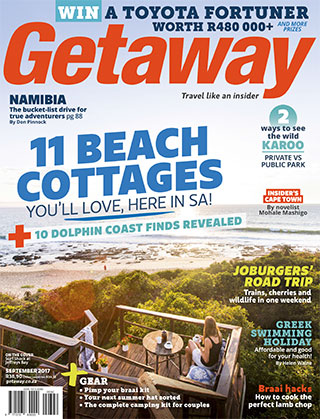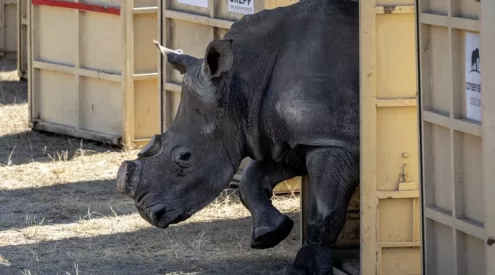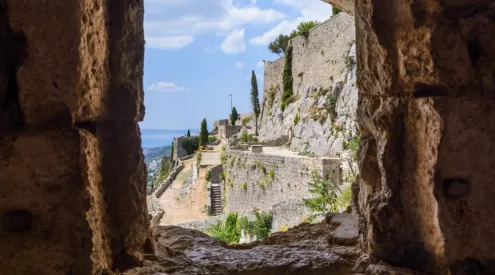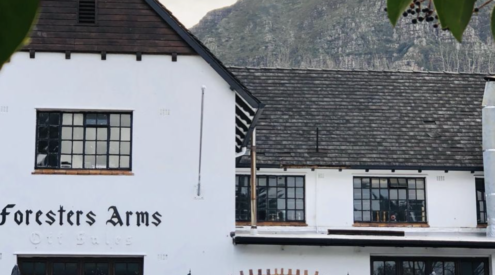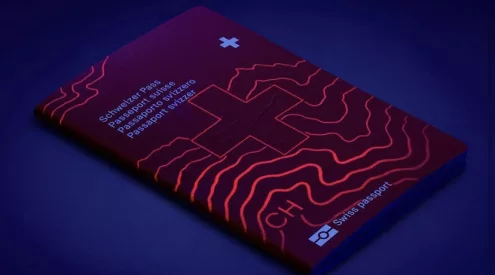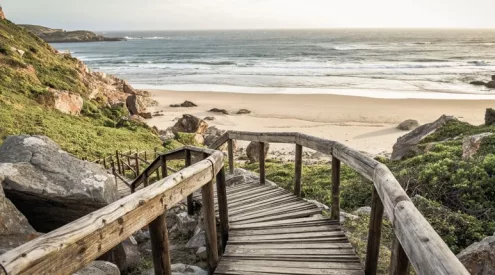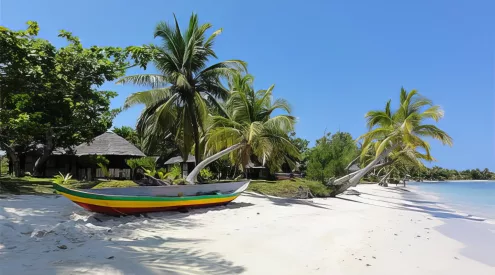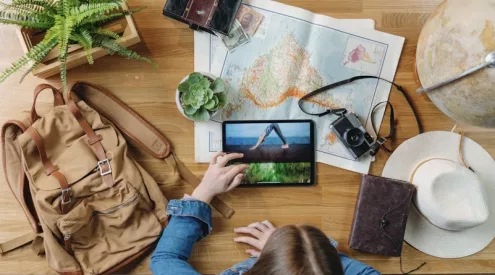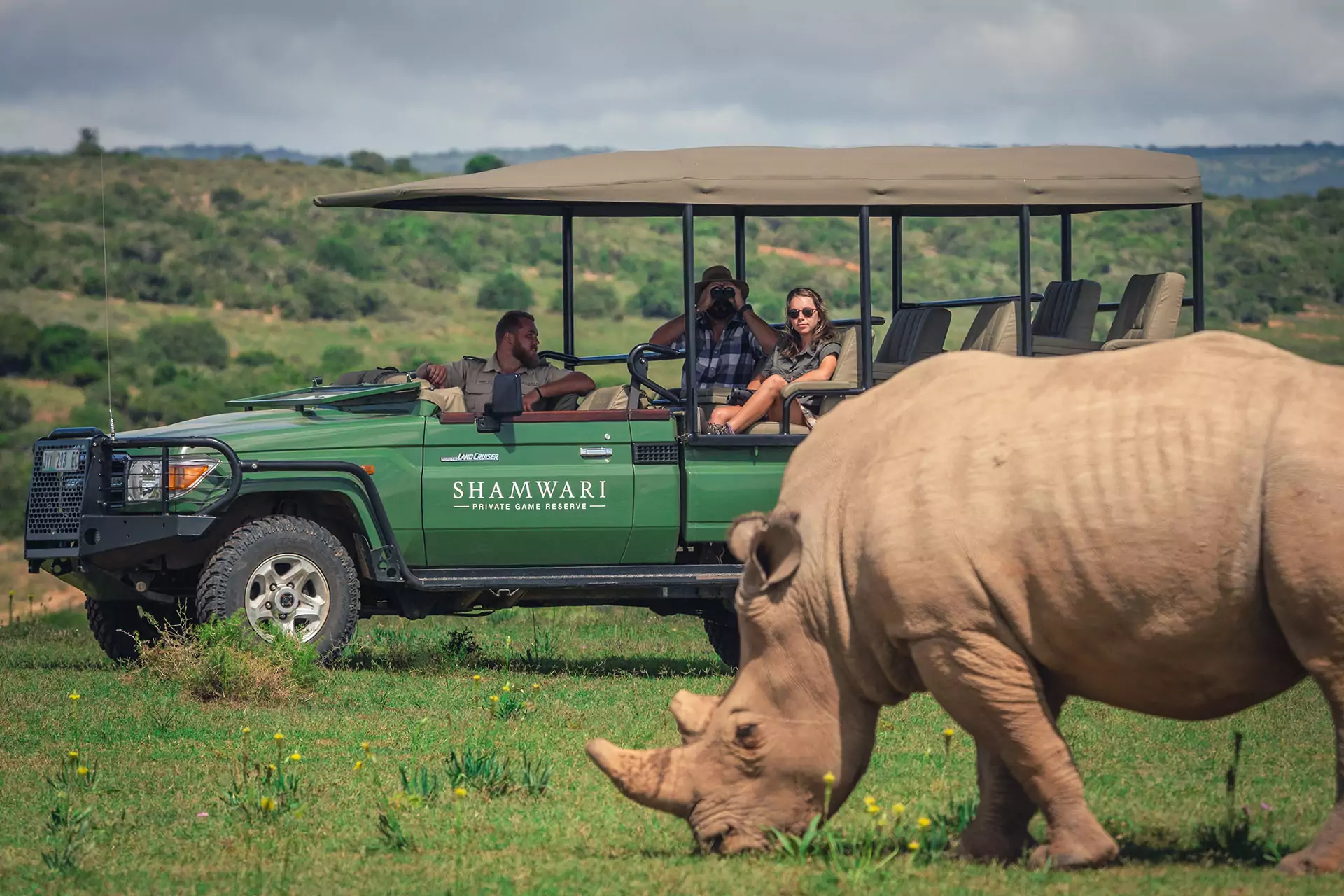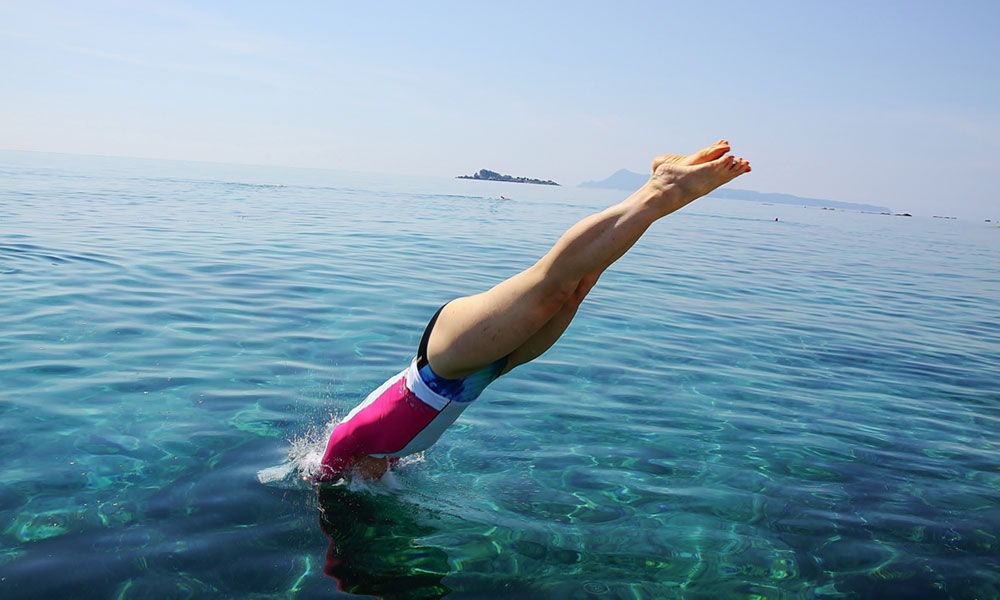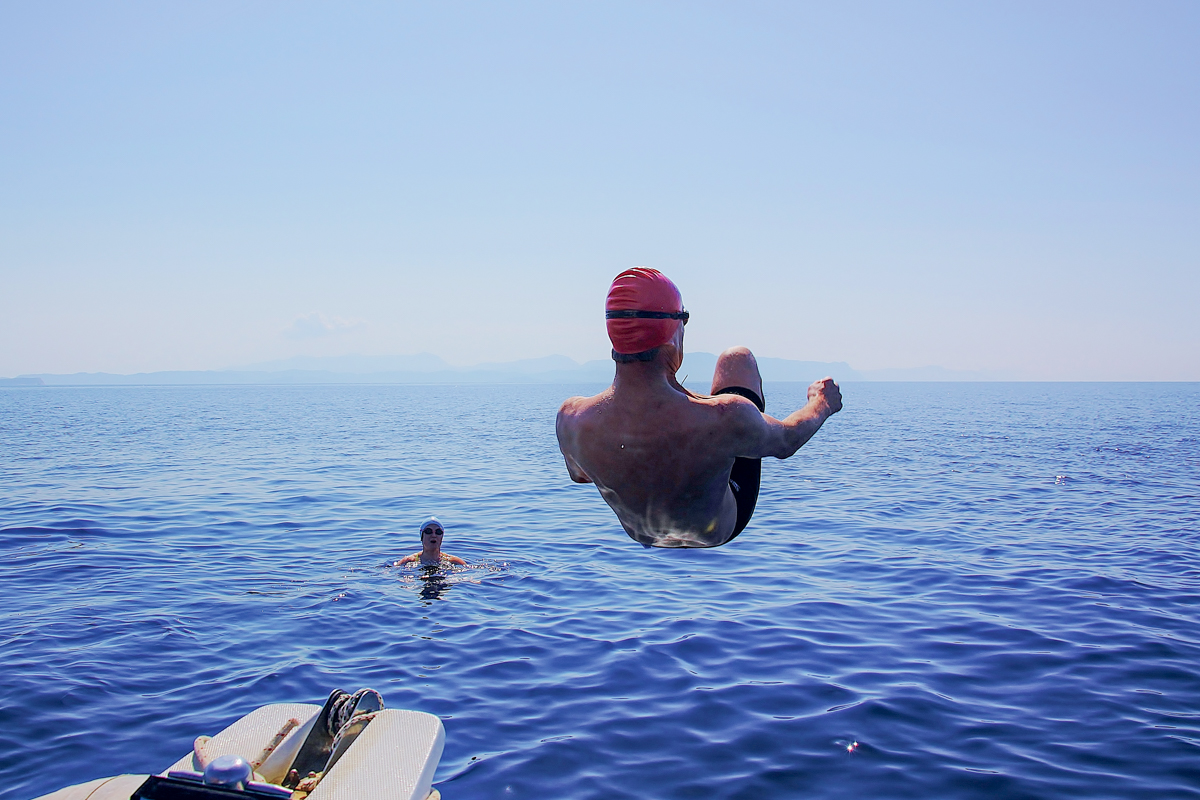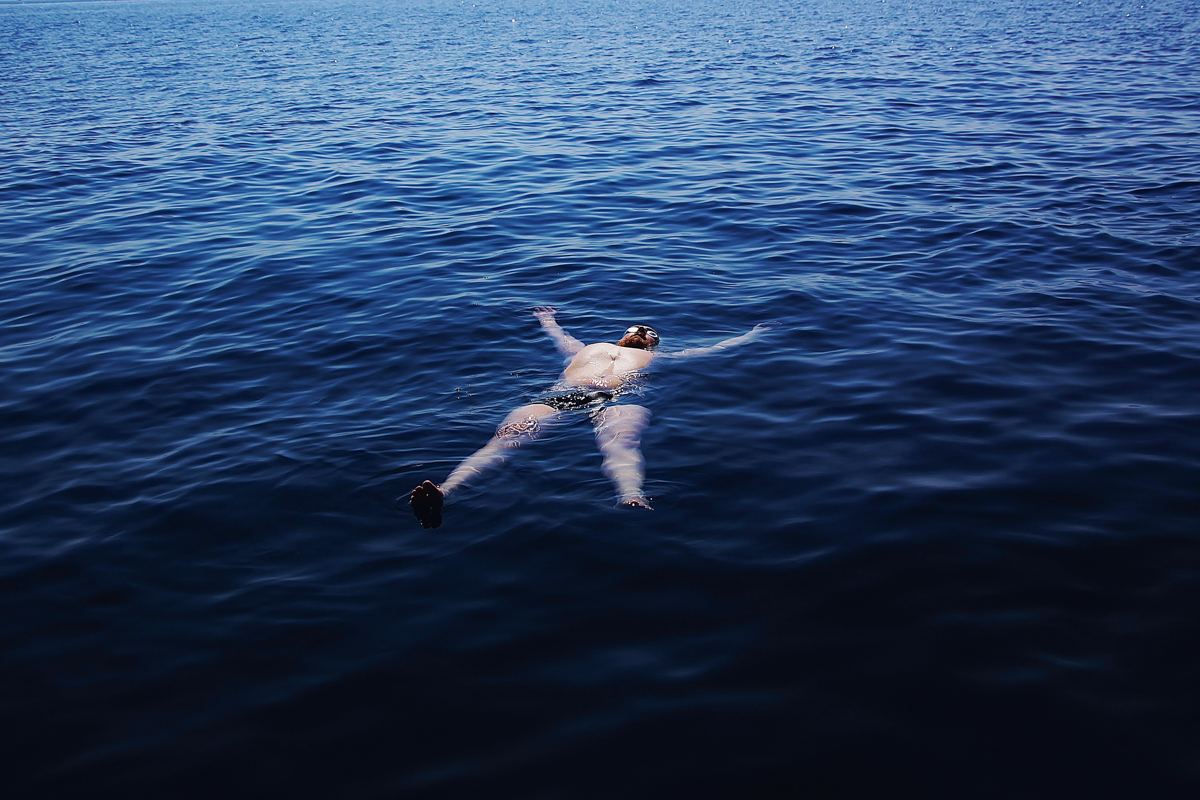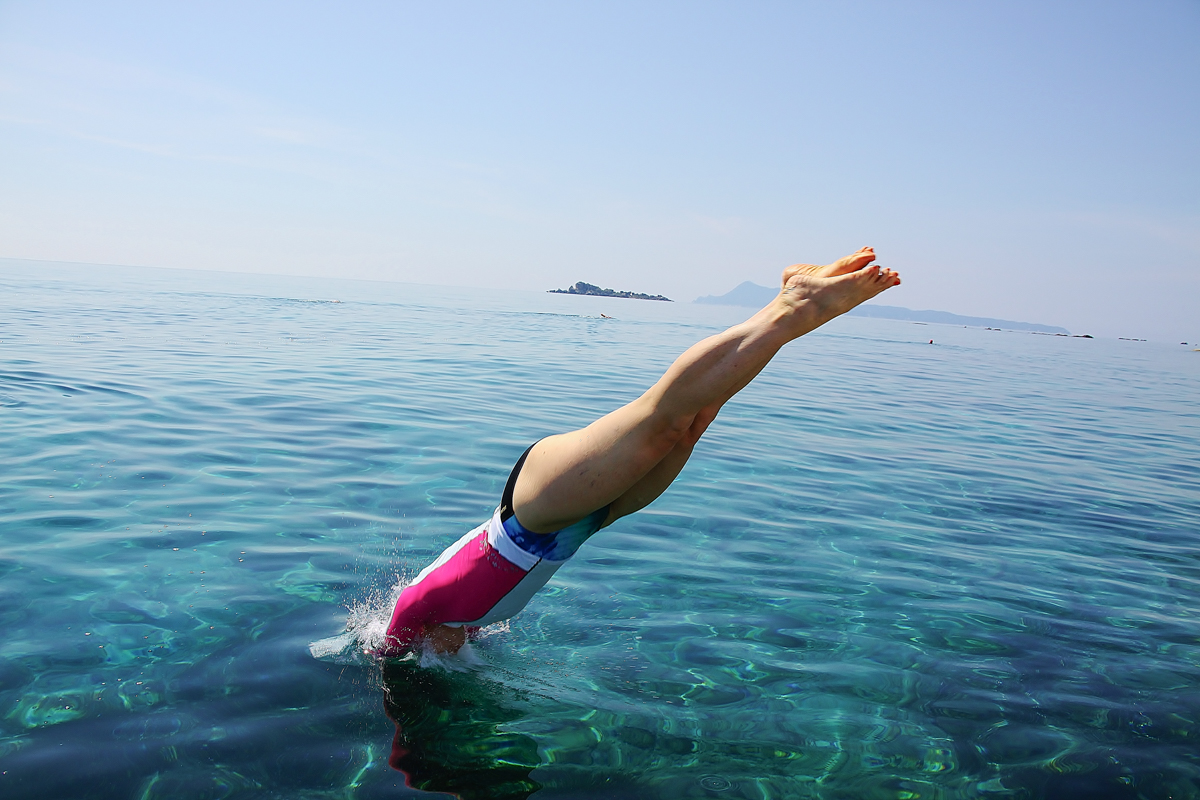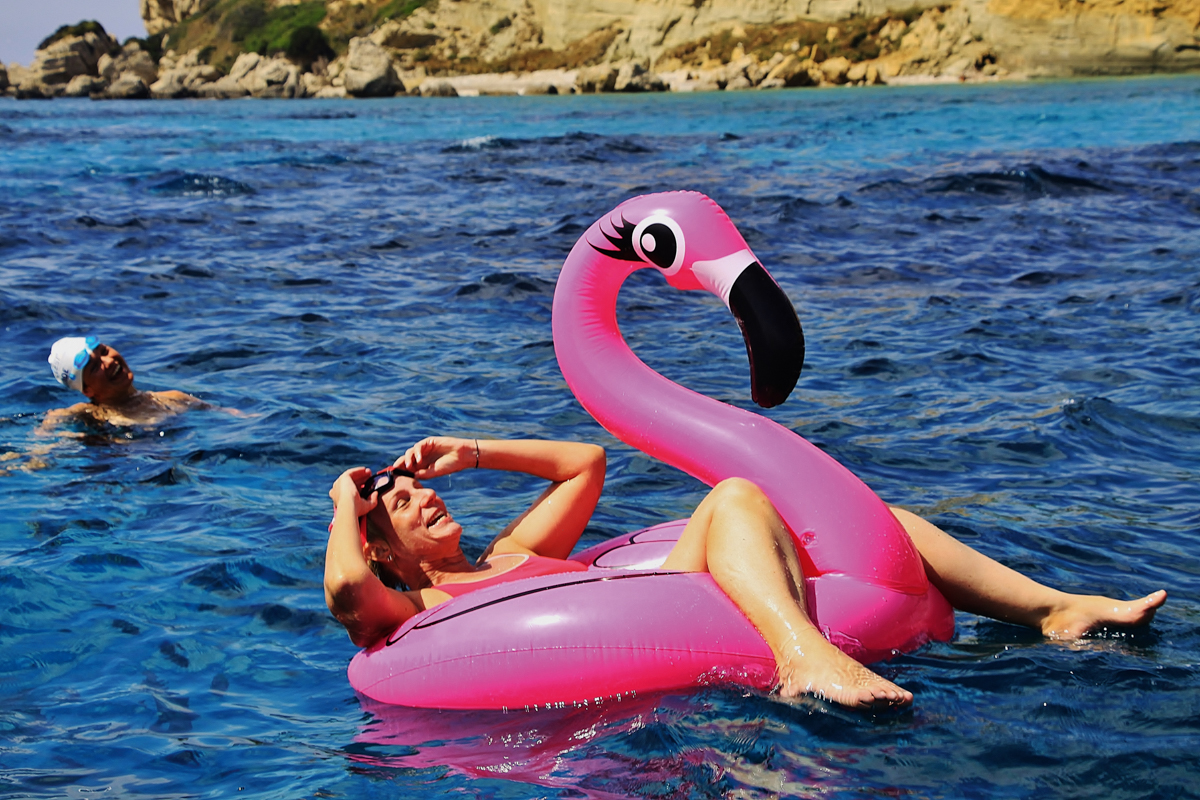There’s a new type of holiday you can do: open-water, or wild, swimming. The waters around the little-known Greek island of Mathraki are perfect for it.
Also read: Swimming in Italy: Salento’s secret swimming spots.
Before Mathraki, I wasn’t fully breathing. I didn’t glide when I swam and I didn’t know the real taste of apricots. I didn’t know the word kalimera and I expected every Greek man to have a moustache. Before Mathraki, I didn’t know what the colour blue was.
Now I not only know its layers, I know its source. If you’d told me 10 years ago I’d become an obsessive open-water swimmer, I would have laughed and reached for another cigarette. I could barely pull on a bathing costume without wincing with thigh shame. But one afternoon in the gym changed that.
Bored with machines and seeking escape from Katy Perry, I slipped into the pool and struggled through a few lengths. And did it again the following day. And again and again. Until, a few months later, I was up to three kilometres and spending every spare hour in the sea or the pool. One morning at the beach, salt crusting on my shoulders, a man asked why I swam so much. ‘For the light and the silence,’ I replied.
Mathraki is a small island north-west of Corfu. Glossy guidebooks might herald it as an ‘undiscovered gem with azure waters’. And although they would be technically correct, the island can’t be reduced to touristy clichés … because it barely knows what tourism is. Part of the Diapontia archipelago, its wooded hills are sparsely dotted with houses, some occupied by the 40 residents estimated to live on the island all year round.
There is no ATM and besides the taverna at Mathraki’s sole hotel, there are just two restaurants, one of which houses a basic shop. In summer, Greeks from Corfu or the mainland might come for a holiday, but most of the tourism involves day-trippers drawn to Mathraki for its solitude and natural beauty.
And it has that in bundles. From the main beach of Portello, the uninhabited islets of Karavi, Diapolo, Plateia and Tracheia hunch in the Ionian Sea like sleeping ketea. In the distance, the hills of Albania appear and disappear mirage-like in the haze.
A walk along the island’s eight-kilometre gravel ring-road takes you past cypress forests, gnarled olive trees, fruit orchards, the husks of abandoned homes and cars, clumps of yellow flowers, tiny bee orchids – and rocky coves serving up bowls of aquarium-like light. And for a week, this pristine place belonged to a small group of us who had signed up for a SwimQuest holiday.
A relatively new concept in South Africa, swimming holidays have become popular among those who like a good dose of freestyle with their free time. They usually involve two guided swims a day – anything from one-and-a-half to six kilometres – and include accommodation, most meals and daily boat trips. Destinations are chosen for their calm, safe and beautiful waters, found in abundance around Mathraki. Unlike my usual swimming spots off Cape Town’s coast, there were no shark threats, no crashing waves, no icy currents – and the clarity of the sea was enough to make someone like me very annoying.
‘I’m going to die of excitement!’ I yelled (again) as I dived off the dinghy into the ocean. Skipper Georgios Argyros, who together with dad Giannis, sister Maria and mom Nora run the Corfu Paradise Mathraki hotel and provide boat support for SwimQuest, had expertly delivered us to this spot in the middle of the sea. Swimming guides Sam Mould from England and Natalie Dumont de Chassart, a Zimbabwean decamped to Mathraki for the season, had been sharing excited glances in the boat as we skimmed across the water.
Once submerged, I could see why. Referred to as the Big Blue, this 50-metre-deep chasm must surely be the spawning place for the colour cobalt. An intense, deep blue textured only by shafts of light, the water pulled us in and held us. In this cocoon of colour, we looked like newly formed creatures drifting in space.
During the course of the week I died of excitement again and again – and made sure everyone knew about it.
‘Dying of excitement!’ I hollered as we struck out on a three-kilometre swim from the tiny, shark fin-shaped island of Karavi back to Mathraki. Minute black fish darted beneath me and rocky shelves dropped away into acres of milky topaz.
‘Seriously dying of excitement!’ I spluttered on a swim around Diapolo, before diving down to admire disc-shaped coral growing like fields of pink mushrooms on smooth rocks. In a sheltered channel between Diapolo and tiny Diakopo, Natalie threw us a giant flamingo-shaped lilo and we took turns paddling it past caves and over patches of turquoise water.
‘Totally dying of excitement!’ I shouted to fellow swimmer Suzie as we kicked and stroked the three kilometres from Kravia islet to Corfu’s harbour village of Arillas. There, warmed by the sun in a seafront taverna and drenched with that sense of relaxation that only comes from being in water, our group tucked into a seemingly endless flow of Greek meze: courgette balls, grilled sardines, dolmades, pita bread, tzatziki, prawns in a rich tomato sauce, hummus and – my favourite – saganaki (pan-fried hard cheese).
Afterwards, a stroll along the main boulevard took us past holidaymakers – many British – lolling on loungers on the sand and floating in the shallows. One woman with sun-pinked shoulders stopped us and asked if we had really swum all the way to Arillas. ‘What about sharks?’ she said. We grinned and felt like heroes.
After drawing cash from the ATM, stocking up on sunscreen and fondling trinkets in shops, we gratefully clambered aboard the dinghy to head back to Mathraki – to its silence and simplicity, its lack of transaction, the slow turning of time.
Opposite the harbour, Theofanis Kasimis was tending his dense vegetable garden, straightening up tomato plants and watering frothy clumps of fennel. Despite a decades-long tradition of islanders migrating to New York in search of work and dollars, he has lived on Mathraki most of his life and says he wouldn’t want to be anywhere else. ‘Here,’ he said, handing me a bouquet of freshly cut artichoke flowers. ‘I am 76 years old, have never been married and this quiet life is good. Would you like to meet my sheep? She’s called Michelle Obaama.’
This warmth and openness could be found across the island: from the woman I met on an early-morning walk who pressed wild carnations into my hand to the welcome we received from Christos, who unlocked the tiny church up the road for us – and then opened up the adjacent bar, where he plied us with olives and served us cold beers; from Christina, who came upon some of our group stealing apricots from her tree and invited them in for coffee to Georgios, Nora, Giannis and Maria who served us delicious home-cooked meals and made us feel like part of their family.
On the last morning, a wind whipped up the bay in front of the hotel. This was where, on the first day, Natalie and Sam had filmed each of us swimming and then given us feedback on our strokes. My hands crossed over in front of me, I didn’t rotate enough and I breathed only to one side. During the course of the week, the guides had egged us on from the boat, shouting out tips and feeding us jelly babies. I had learnt more about swimming from them in a few days than I had at months of squad training.
From my balcony I watched as, one by one, the other swimmers wandered across the sand, stripped off their clothes and waded into the sea. There were whoops and squeals, limbs carving up water. I pulled on my costume, grabbed my goggles and hurried down.
Plunging into the sea, I struck out towards the others, focusing on keeping my arms wide, my shoulders relaxed and turning to breathe on every third stroke. ‘Guys, guys!’ I cried. ‘I’m bilateral breathing!’ Then I ducked under the surface to the bottom of the world to watch the water make X-rays of the sun.
5 ways to swim wild water in SA
SA has an abundance of open water for swimming – two oceans, myriad dams, lagoons and rivers. However, it’s best not to tackle these alone, particularly the sea, which can be dangerous due to currents, tides, rips and animals. There are numerous open-water swimming groups across the country that welcome those keen to take the plunge.
Also read: The best SA Beaches to swim at this summer.
1. The Sunday Hot Chocolate Swimming Group meets in Camps Bay in Cape Town every Sunday at 09:00 and swims in pretty chilly water. Swimmers warm up afterwards with a hot chocolate at Café Caprice. Call Ram Barkai on 0826568909 or find it on Facebook.
2. Jeffrey’s Bay Open Water Swim Club also operates throughout the year, with summer swims on Tuesdays and Thursdays at 17:15 and winter forays on Sundays at 9:30. The group swims in the protected waters of the marina, which makes it a perfect spot for beginners. Call Brenton Williams on 0835496795 or find it on Facebook.
3. Stellenbosch Open Water Club (3YO Training Camps) swims in fresh water at Boschendal wine estate at 5.30pm every Friday in summer and at 15:00 on the first Sunday of the month in winter. Call Annchen Clarke on 0730523770 or check it out on Facebook.
4. The Blu Smooth Group in Port Elizabeth, which has been going for three years, swims at 17:00 every Friday from Hobie Beach, weather permitting. Call Kevin Richards on 0747300650.
5. In Durban, an informal group has started swimming from the Durban Underwater Club. Call Geoff Harrison on 0833827086.
Plan your trip to Mathraki
Getting there
I flew to London with Emirates; from R9900 return. From there I flew to Corfu with Easyjet; from R3600 return. I then took a bus from the airport in Corfu to the small town of Agios Stefanos for R57 and then a water taxi to Mathraki, organised by the hotel I’d be staying at. From R749 return.
When to go
SwimQuest runs its Mathraki holidays from May to September, when the weather is generally sunny and the sea about 24 ̊C. Corfu and surrounds were still relatively un-swamped by tourists when I went in the first week of June.
Need to know
There are no ATMs on Mathraki, so take enough cash. Beers cost about R30, a carafe of wine is R75 and an ice cream from R22. Take sufficient good-quality sunscreen as you’re out in the sun most of the day – and a quality bottle of the stuff on Corfu costs the equivalent of R200. I bought a ‘cheap’ R70 bottle on the third day and paid the price. South African passport holders need a Schengen visa (R900).
Swimming tour cost
The holiday in Mathraki costs from R13078 and includes accommodation, breakfast, lunch and guided swims assisted by safety boats, plus you get a SwimQuest dry bag and swimming cap. Dinner, drinks and extras are for your own account but to make matters simple, SwimQuest collects R1722 from each person to cover dinners for the entire week. While SwimQuest adjusts the swims according to competency, you should be able to comfortably swim a kilometre to sign up. SwimQuest also offers swimming holidays in Croatia, Italy, the Maldives, Egypt and even the Arctic Circle.
Stay here
Corfu Paradise Mathraki is the only hotel on Mathraki. Accommodation is simple and comfortable and the beach is 10 metres from the hotel. Opt for the upstairs sea-facing double room, which has doors that open onto a large shared terrace and views of the ocean. From R449 per double room, excluding breakfast.
Do this
1. Walk to Apidies harbour. About 1,5km from Corfu Paradise Mathraki, you’ll take in the scent of wild herbs and pine before cooling off with a dip off the jetty.
2. Sip a beer in the vine-dappled courtyard at the small bar next to the tiny St Spiridon church. It’s best to phone ahead (a hotel staff member will do this for you) to ask Christos to open up. The church contains several chandeliers with engraved metal tags attached in memory of parishioners.
3. Snorkel around the rocks of the old pier. The area is to the right of the hotel (if you’re looking out to sea). You’ll spot a range of fish – most quite small – and, if you’re lucky, a turtle or two.
Eat here
1. Dolphins Restaurant is at Mathraki’s main port of Plakes, and its large terrace is a great sundowner spot. Meals are generous and hearty, served by amiable owner Kostas Soukeras. A three-course dinner (meze starters, mains and dessert) plus wine is about R270 per person.
2. Levante Taverna, perched on a hill above the harbour, has incredible views across the sea to Corfu. Owners Jimmy and Tasoula Katechis lived in New York for 27 years and recently returned to the island. Barbecued fresh fish and meat can be made to order and vegetarians will be spoilt for choice by the myriad meze offerings.
3. Portofino is a homely tavern on the seafront in Arillas, Corfu, serving Greek dishes. Despite emerging from the sea after our swim looking like sucked mango pips, we were welcomed to a table on the terrace where we fell upon the tasty meze. R197 for two.
This swimming story first appeared in the September Getaway issue.
Our September issue features 11 amazing beach cottages, two ways to see the Klein Karoo, a windswept 4X4 drive in Namibia, our guide to swimming in Greece and much more!
